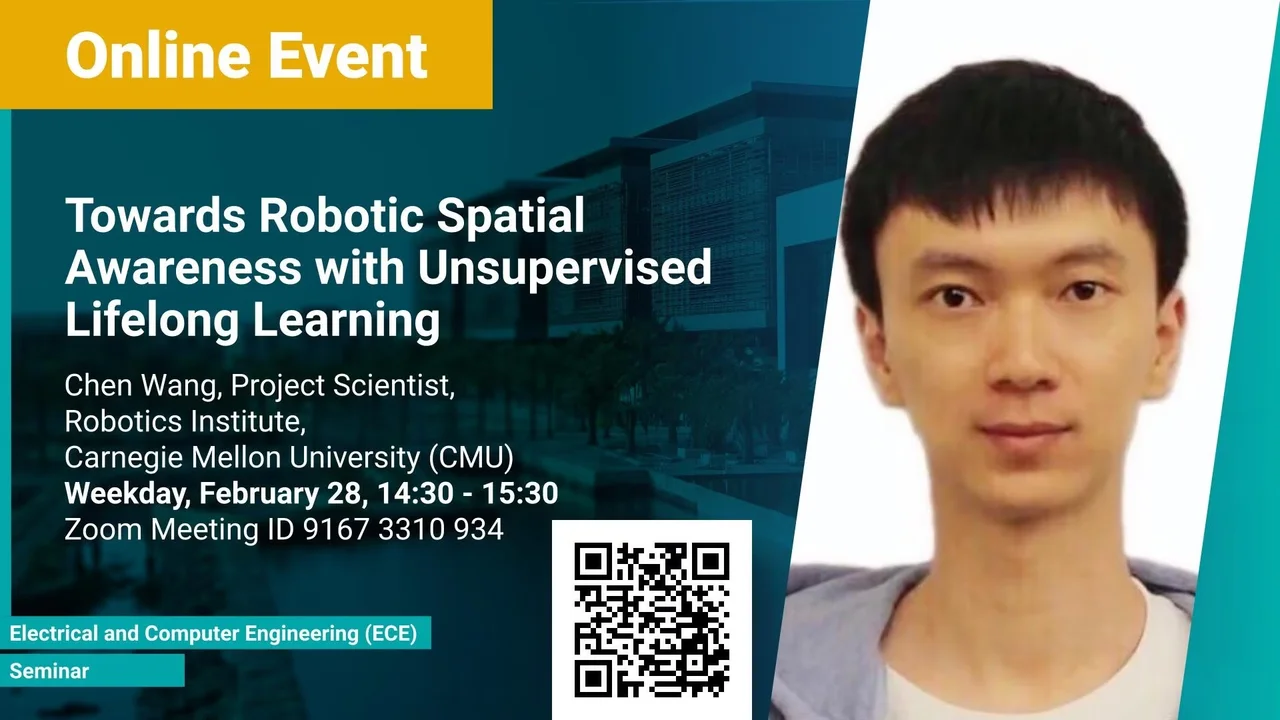
Towards Robotic Spatial Awareness with Unsupervised Lifelong Learning
- Chen Wang, Project Scientist, Robotics Institute, Carnegie Mellon University (CMU)
KAUST
People have used robots for more than six decades to empower people to do things that are typically dirty, dull, or dangerous. The industry has also progressed significantly over the period from basic mechanical assist systems to autonomous cars, environmental monitoring, and exploration of outer space. Despite those achievements, the robots still cannot work like human being because of lacking real spatial awareness. For instance, humans can easily tidy up a messy room, while robots even have difficulty to re-identify a novel toy misplaced. To solve this problem, we need the robot to have human-like knowledge and spatial awareness, which refers to being aware of our surroundings and our state relative to them. Spatial perception consists of two processes, the exteroceptive process, which creates representations about space through feelings and learning and interoceptive process, which creates a mechanism to memorize the experience as well as cognizing information about our body, such as position and orientation. In this talk, I will preset our recent work towards robotic spatial awareness, including robust space representation, visual memorability, lifelong learning ability, and self-motion cognition. We expect that the ability of spatial awareness will be able to promote the robots to automatically adjust to stochastic, dynamic, and non-stationary environments.
Overview
Abstract
People have used robots for more than six decades to empower people to do things that are typically dirty, dull, or dangerous. The industry has also progressed significantly over the period from basic mechanical assist systems to autonomous cars, environmental monitoring, and exploration of outer space. Despite those achievements, the robots still cannot work like human being because of lacking real spatial awareness. For instance, humans can easily tidy up a messy room, while robots even have difficulty to re-identify a novel toy misplaced. To solve this problem, we need the robot to have human-like knowledge and spatial awareness, which refers to being aware of our surroundings and our state relative to them. Spatial perception consists of two processes, the exteroceptive process, which creates representations about space through feelings and learning and interoceptive process, which creates a mechanism to memorize the experience as well as cognizing information about our body, such as position and orientation. In this talk, I will preset our recent work towards robotic spatial awareness, including robust space representation, visual memorability, lifelong learning ability, and self-motion cognition. We expect that the ability of spatial awareness will be able to promote the robots to automatically adjust to stochastic, dynamic, and non-stationary environments.
Brief Biography
Dr. Chen Wang is currently a project scientist with the Robotics Institute at Carnegie Mellon University (CMU). He received the B.Eng. degree in Electrical Engineering from Beijing Institute of Technology (BIT) in 2014 and Ph.D. degree in Electrical Engineering from Nanyang Technological University (NTU) Singapore in 2019. His research interests include robot perception, computer vision, and machine learning. His research goal is to achieve greater autonomy and intelligence in real-time on robotic systems. He is also engaged in delivering simple and efficient source codes. Dr. Wang is currently serving as an Associated Editor for IEEE Robotics and Automation Letters (RA-L). He has received the Best Paper Award in robotic planning from the 2017 International Conference on Advanced Robotics (ICAR).